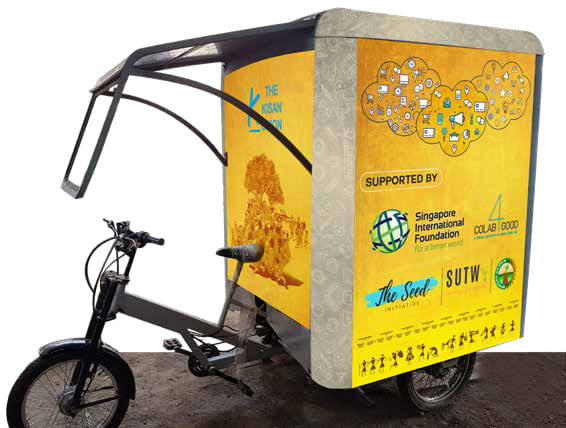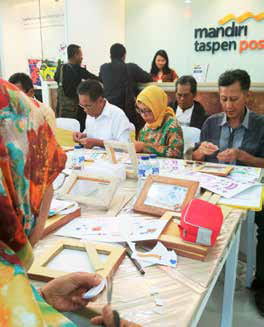Stories > Commerce with a Conscience
Commerce with a Conscience
A decade since its launch by Singapore International Foundation, alumni of the Young Social Entrepreneurs’ programme share insights on how mentorship and the right support networks have helped them establish socially responsible ventures that impact lives.
BY Audrina Gan
oing social good and running a commercial enterprise need not be mutually exclusive. In order to do good, you first have to do well. That is a key takeaway from past and present participants of the Singapore International Foundation (SIF)’s Young Social Entrepreneurs’ (YSE) programme.
The following stories provide a glimpse into how mentorship and the right support network can pave the way for creative ideas to turn into sustainable ventures that bring about societal good.
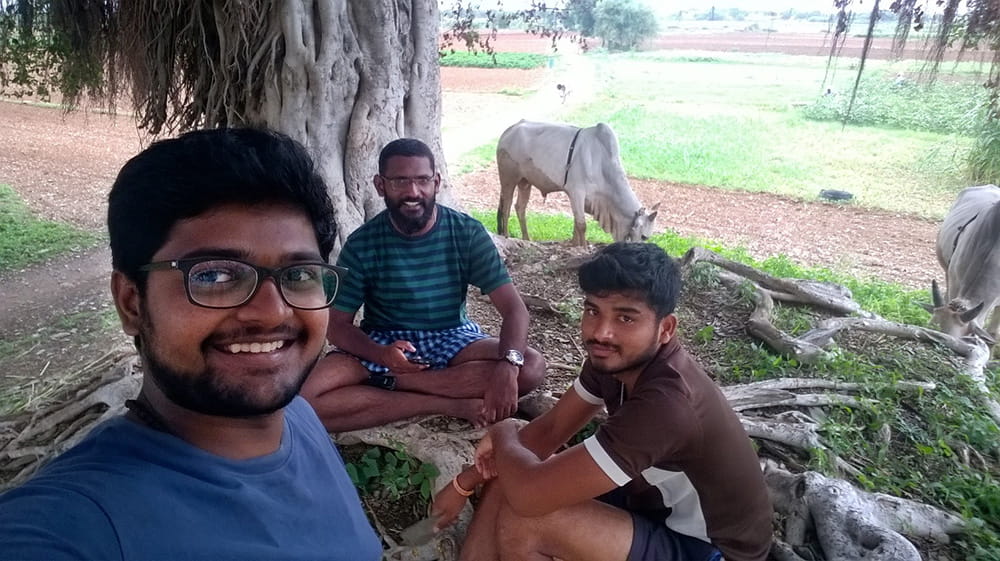
THE KISAN UNION
Indian national Nikhil Mukkawar (far left) met Singaporean Ho Jing En when they were both pursuing their studies at the Nanyang Technological University (NTU).
Their first encounter took place at Enactus, a student-led club that aims to nurture future social entrepreneurs and business leaders.
Since its establishment 10 years ago, the signature initiative has supported several ventures around the globe. Indeed, entrepreneurship is far from being a walk in the park; it requires not only intellect and business acumen, but also a commitment to finding innovative solutions to everyday problems, an open mind to learning, and staying the course in the face of relentless challenges.
“Initially, while in search of a co-founder, I had pitched an idea at Enactus Club to develop a platform inspired by Uber for agriculture machinery, ” recounts Mukkawar, an engineer by training and co-founder of The Kisan Union.
“Being a business student, Ho found this case study interesting and decided to join me.” The team later expanded to include another NTU alumnus, Singaporean Kannan Venkataramanujam.
The trio soon realised that the hiring services model was inadequate for solving the myriad of challenges faced by farmers – from land preparation for farming to the sale of the produce.
“We thus decided to combine business and engineering to build a mobile solution that can cater to their needs,” says Mukkawar, who has previously designed agriculture machinery for marginalised farmers while conducting R&D for an engineering firm.
|
Each of The Kisan Union’s solar-powered mobile kiosks is installed with a 46cm LED screen and public speakers that broadcast information about government policies, agricultural grants and subsidies, as well as healthcare schemes in the rural villages in India, most of which its farmers are not aware of. Villagers can access the information on-screen or via their own devices by connecting to the kiosk’s Wi-Fi services. They charge farmers a modest US$0.20 for completing a basic questionnaire to determine which schemes they can avail of, and US$0.50 to help them apply for the relevant grants. Designing a low-cost “office on wheels” that could meet the harsh road conditions in rural areas was challenging. The kiosk went through multiple iterations before evolving into its current prototype. |
The Kisan Union’s solar-powered mobile kiosk provides information on agriculture and healthcare schemes to the farmers in rural areas. |
Another difficulty lay in tailoring its services to tie in with the cultural context and needs of each village.
“Our business mentor, Mr Matteo Chiampo [a consultant with the Consultative Group to Assist the Poor], suggested that we stay in the individual villages to better understand the localities and the farmers’ problems, which helped us create more effective solutions,” elaborates Mukkawar.
As a case in point, the enterprise currently operates its kiosk in a village in the Prakasam district of Andhra Pradesh – an arid region where farm cropping is only done once a year.
“Soon after the monsoon season, the locals tend to look for other work opportunities to ease their household income for the next three to four months,” explains Ho.
The solution? Farmers and youths are recommended for skilled training courses offered through government-aided schemes. Both Mukkawar and Ho credit the YSE programme for helping to evolve the business model for their fledgling social enterprise.
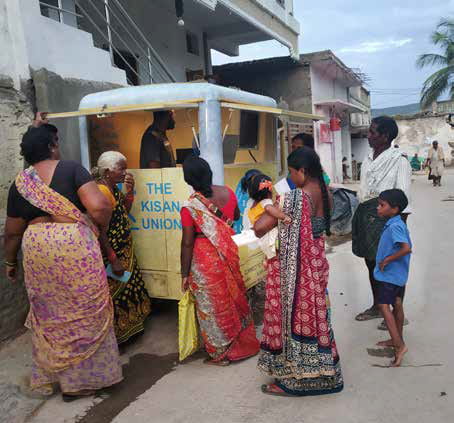 Besides the customised mentorship, the team was impressed by the different components that equipped them with the skill sets to further their venture.
Besides the customised mentorship, the team was impressed by the different components that equipped them with the skill sets to further their venture.
“The workshop by [SIF’s digital storytelling unit] Our Better World showed us how stories could be leveraged to obtain the public buy-in, and inspiring them to take action,” recalls Ho.
“We also enjoyed the pitching workshops by Ms Chua Ruo Mei [founder and chief impact officer of SUTW Impact Consulting], which were helpful for teams with limited experience in seeking funding.
In fact, she continues to advise and mentor us to this day.” The fledging social enterprise aims to build more kiosks and act as a service delivery partner for organisations hoping to reach out to rural communities in the next few years.
BHUMIHARA
Hailing from an engineering background, Fadhila El Discha knew she needed to acquire economic and strategic management skills to build her new social enterprise.
“The Workshop By SIF’s Digital Storytelling Unit, Our Better World, Showed Us How Stories Could Be Leveraged To Obtain The Public Buy-in And Inspiring Them To Take Action.”
Ho Jing En, Co-founder, The Kisan Union
The year was 2016, and she had recently co-founded Bhumihara – an integrated waste management programme operating off small Indonesian islands – with two friends.
 Incidentally, it was the year the SIF expanded the YSE programme overseas to organise its first ever overseas workshop in Jakarta, Indonesia. “We were looking for information on start-up coaching and incubator platforms when we discovered a call for application to the YSE overseas workshop in Jakarta,” says El Discha.
Incidentally, it was the year the SIF expanded the YSE programme overseas to organise its first ever overseas workshop in Jakarta, Indonesia. “We were looking for information on start-up coaching and incubator platforms when we discovered a call for application to the YSE overseas workshop in Jakarta,” says El Discha.
“Our application was unsuccessful the first time, so we tried again in 2017. This time around, we got in.”
Bhumihara was born after a volunteering stint by El Discha and her team in Sangihe and Baewan, two of thousands of inhabited small islands in Indonesia.
The experience opened their eyes to the serious issues plaguing waste management activities in such remote areas.
“Apart from the lack of education, there were no organised waste management facilities, either from the public or private entities,” notes El Discha.
“The locals had no choice but to dispose their waste on empty land, river and forest areas, which led to pollution in these ecosystems.
Such practices are likely to worsen due to a growing population and the rampant use of plastic.” Through the YSE programme, El Discha met fellow participant Pramod Bhurji. The co-founder of WOW Foundation from India was seeking to provide affordable, eco-friendly and sustainable solid waste management services to Tier 3 cities in India.
“We learnt from his experience in finding investors and engaging his target market,” says El Discha.
This meant taking a leaf out of WOW Foundation’s approach – by raising awareness about the importance of waste management, while simultaneously assisting the local authorities in building a better waste collection mechanism.
Still, Bumihara faces a myriad of challenges running a greenfield project on a small island. This includes finding viable land for the material recovery facilities, sorting out the type of land lease required for the project, and inking contracts for waste disposal with the local authorities.
It also had to cope with logistical issues, as the distribution of goods and manpower relies heavily on weather conditions and the availability of ships. The Bhumihara team thus sought practical tips from its business mentors – social entrepreneur and founder of Singapore’s first sustainable urban rooftop farm, Alan Lim, as well as McKinsey & Company associate Indrawan Wijaya.
“Alan evaluated our operational strategy, such as estimating the time needed to pick up waste from the entire neighbourhood and maximising vehicle use, while Indrawan conducted useful sessions on how to refine our business model,” she shares.
“We’ve since learnt to allocate more time in our planning to mitigate delays caused by logistical problems and weather conditions.”
El Discha is in the midst of expanding the territorial scope of her project.
“We currently serve 300 households on Bawean Island, who no longer dispose of their waste in the open, while also developing a second waste management system in another village on the same island,” she says.
The team hopes to serve up to 700 households by the end of 2019, while seeking a new project on another island. To ensure the sustainability of the project, they conduct waste management workshops for students and young people in Bawean every month.
They also take time to give back to the YSE network – spreading word about new applications through their online platforms and taking part in Indonesia-based events whenever possible.
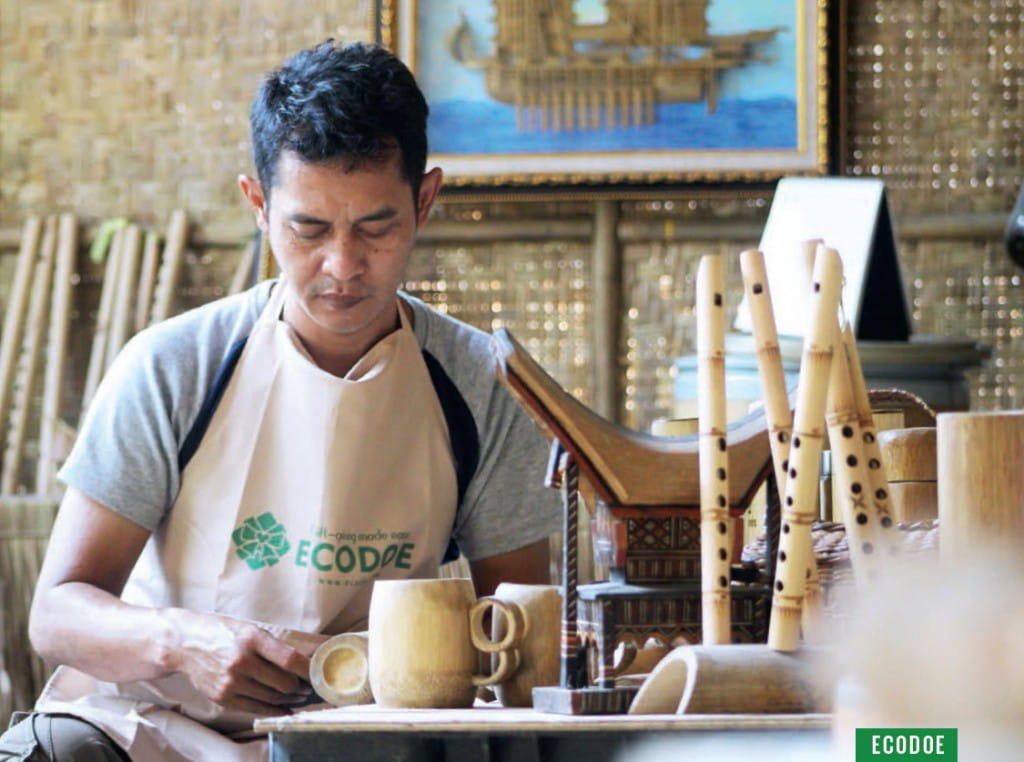
“Bhumihara Took A Leaf Out Of A Fellow Yse Participant’s Approach To Waste Management – By Raising Awareness About Its Importance While Simultaneously Assisting The Local Authorities In Building A Better Waste Collection Mechanism.”
ECODOE
For founder and CEO of Ecodoe, Larasati Widyaputri, 2015 was the year that marked the start of her YSE journey. The Indonesian runs an e-commerce platform that offers handmade souvenirs and gifts for business and government clients, and seeks to empower the local craftsmen who produce them.
The decision to establish her venture was largely influenced by a university study trip to Yogyakarta and Bali back in 2014. After speaking with some 100 artisans, she was shocked to learn that most of them had to abandon their traditional livelihoods due to the low income, and seek work as temporary construction labourers in Jakarta instead.
“Ecodoe became the win-win solution for them,” she explains.
“Before Joining Ecodoe, Each Artisan Made Less Than US$50 Per Month. Now, They Receive Up To US$100 Every Week.”
Larasati Widyaputri, Founder And CEO Of Indonesia-based Ecodoe
“Before joining us, each artisan made less than US$50 per month. Now, they receive up to US$100 every week.”
Widyaputri cites meeting with successful social business ventures during an overseas study visit to Mumbai – a component of the YSE programme – as inspirations.
|
After visiting Mumbai on a learning journey, organised by SIF, Ecodoe switched its consignment-based business model to an e-commerce concept. |
On a trip to the slum area of Dharavi – the backdrop for Academy Award-winning movie Slumdog Millionaire – she discovered how the inhabitants connected with one another, developed their own industries within the small area, and established large-scale distribution networks for their products. “That led us to transform our consignment model into an e-commerce model, increasing the artisans’ reach to clients across Indonesia,” she says. The learning journey also introduced her to firms such as Bombay Hemp Company, a social business that assists local farmers in the cultivation of industrial hemp, which is then used for a myriad of products, from yarn to medicine. There, Widayaputri learnt the importance of diversified product range. Business sessions with subsidiaries of leading Indian conglomerate Tata Group – Taj Hotels and Tata Motors – provided more insights on good corporate governance. Meanwhile, global non-profit organisations Ashoka and UnLtd connected her with their Indonesian representatives, who showed her how to pitch for funding through effective storytelling. Ecodoe has since grown from a business with two homemakers and two raw material suppliers to a network spanning 273 artisans. |
The YSE alumnus shares: “We aim to train and collaborate with 1,000 new creators to generate an estimated revenue of US$2.8 million by the end of 2023.” She now takes part in the annual Jakarta overseas workshop to mentor new participants. She also speaks regularly on women-driven impact investment at events hosted by the Asian Venture Philanthropy Network.
The Singapore-based funders’ network and YSE partner is committed to building a high-impact social investment community in the region.
NURTURING FUTURE CHANGEMAKERS
The YSE programme marks its 10th anniversary this year. Since its inception in 2010, the SIF signature programme has groomed 1,000 alumni spanning 30 nationalities, including Algeria, Argentina, Australia, Azerbaijan, Bangladesh, Bhutan, Brazil, Britain, Brunei, Cambodia, Canada, China, India, Indonesia, Malaysia, Mexico, Myanmar, Nepal, New Zealand, Pakistan, the Philippines, South Korea, Singapore, Sudan, Thailand, the Netherlands, the United States, Vietnam and Yemen.
Over 80 per cent of the shortlisted teams over the last decade are still in operation today.
Each year, the main programme begins in March in Singapore, and shortlisted teams attend mentorship sessions, study visits and webinars over an eight-month period.
It culminates in a Pitching for Change session in Singapore, where teams stand to win up to $20,000 in funding to start or scale their enterprises.
Since 2016, a series of week-long overseas workshops have also been conducted for participants in Jakarta, Kuala Lumpur and Mumbai, with an overseas workshop taking place for the very first time in Shanghai this past July.
At the YSE 2019 Workshop held in Singapore in March, 90 young entrepreneurs from 13 countries presented 45 projects. Out of these, 15 social enterprises from Bangladesh, Cambodia, India, Indonesia, Malaysia, Pakistan, Singapore and Thailand have been shortlisted.
They are presently on a mentorship scheme led by McKinsey & Company, Temasek International and seasoned entrepreneurs. In October, the teams will reconvene in Singapore for the Pitching for Change session.

